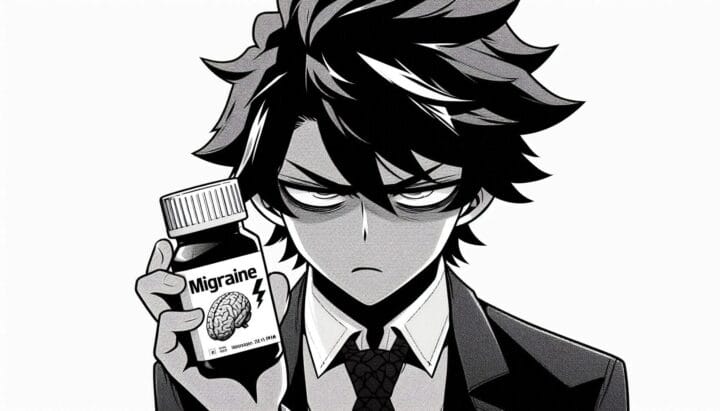What is the Strongest Medication for Migraines?
Table of Contents

What is the Strongest Medication for Migraines?
Migraines can be incredibly debilitating, leaving you in search of effective relief. But what is the strongest medication available for these intense headaches? Let’s explore the various migraine medications and identify the most effective options.
The Migraine Medication Landscape
When it comes to migraine medications, there isn’t a one-size-fits-all solution. Different drugs work in different ways, and what may be the most effective for one individual may not be for another.
Types of Migraine Medications
Migraine medications generally fall into two categories:
- Acute treatments (for immediate relief during a migraine attack)
- Preventive treatments (to reduce the frequency and severity of migraines)
Let’s take a closer look at the key medications in each category.
Acute Treatments: Immediate Relief
Triptans: The Traditional Choice
Triptans are among the most commonly prescribed medications for migraines. They are effective in relieving symptoms for many people.
Sumatriptan: A Fast-Acting Option
Sumatriptan, especially in its injectable form, is often regarded as one of the quickest-acting migraine medications available.
Rizatriptan: A Reliable Alternative
Rizatriptan is another effective triptan known for its rapid action and reliability in treating migraine attacks.
Ergotamines: The Established Option
Ergotamines have been around for a long time and can still be effective for some individuals.
Dihydroergotamine (DHE): A Long-Lasting Choice
DHE is particularly useful for those who experience prolonged migraines, offering relief that can last for several hours.
CGRP Antagonists: The Newer Treatments
CGRP antagonists are a newer class of medications that have shown promise in treating migraines effectively.
Ubrogepant and Rimegepant: Emerging Options
These oral medications are gaining popularity for their effectiveness and lower risk of cardiovascular side effects compared to traditional treatments.
Lasmiditan: A Different Approach
Lasmiditan is a newer medication that works differently from triptans and is effective for treating acute migraine attacks.
Preventive Treatments: Long-Term Solutions
CGRP Monoclonal Antibodies: Advanced Preventive Options
These newer medications are specifically designed for migraine prevention and have shown great effectiveness.
Erenumab, Fremanezumab, and Galcanezumab: Targeted Treatments
These injectable medications can significantly reduce the frequency and severity of migraines for many patients.
Botox: An Unexpected Preventive Treatment
Botox injections, typically known for cosmetic use, can also be effective in preventing chronic migraines.
Antiepileptic Drugs: Versatile Preventive Medications
Medications such as topiramate and valproate, originally developed for epilepsy, have also been found to help prevent migraines.
Choosing the Right Medication: Important Considerations
Selecting the strongest migraine medication isn’t just about effectiveness. It’s essential to find a treatment that suits your specific needs. Here are some factors to keep in mind:
- Your migraine pattern and frequency
- Any other health conditions you may have
- Potential side effects of the medications
- How quickly you need relief
- Cost and insurance coverage
Consulting Your Doctor: The Best Approach
The strongest migraine medication is the one that works best for you with the fewest side effects. Consulting with a healthcare professional can help you make an informed decision about which medication is right for your situation.
Conclusion
In the realm of migraine medications, strength is not solely about immediate pain relief. It’s about finding a treatment that consistently alleviates symptoms and allows you to regain control over your life. Whether it’s a fast-acting triptan, a new CGRP antagonist, or a preventive option like Botox, the most effective migraine medication is the one that fits your individual needs.
Don’t hesitate to explore different options or combinations with your doctor’s guidance. With the right treatment plan, you can effectively manage migraines and improve your quality of life.
FAQs
Can using migraine medication too frequently cause issues?
Yes, overuse of acute migraine medications can lead to medication overuse headaches. It’s crucial to follow your doctor’s instructions and limit the use of acute treatments to avoid this problem.
Are over-the-counter pain relievers effective for migraines?
For some individuals with mild migraines, over-the-counter medications like ibuprofen or aspirin may be sufficient. However, prescription medications are generally more effective for moderate to severe migraines.
Can migraine medications be used during pregnancy?
Many migraine medications are not recommended during pregnancy. Always consult your doctor about safe options if you are pregnant or planning to become pregnant.
How do I know if I should use acute treatment or preventive medication?
If you experience frequent or severe migraines that significantly impact your daily life, your doctor may recommend preventive treatment in addition to acute medication.
Are there non-drug treatments that can be as effective as medication for migraines?
While not typically as fast-acting, some people find relief from non-drug treatments such as acupuncture, biofeedback, or neuromodulation devices, especially when used alongside medication.













Post Comment